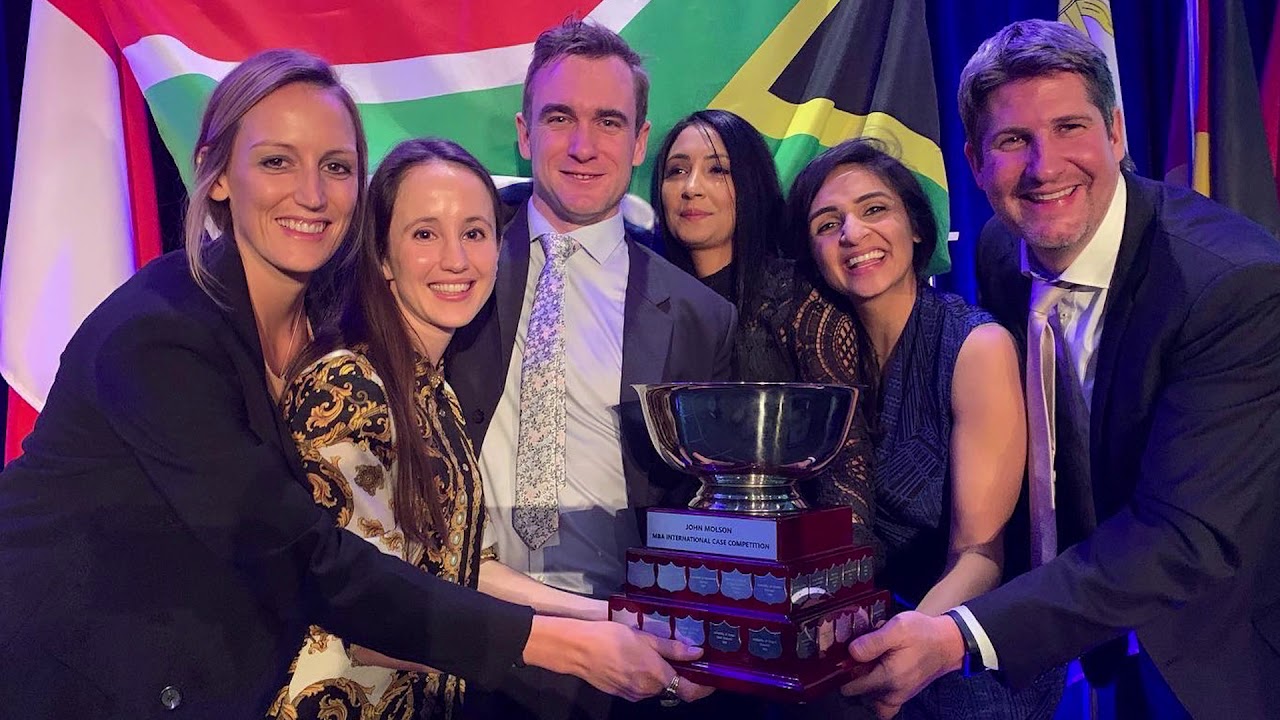CWC VOICES
From the classroom to the boardroom: Why the Case Method really matters
What’s it like to be in the driver’s seat of a complex business challenge, surrounded by a high-performance pit crew, racing against the clock, and facing real-world complexity head-on? Recent GSB and USB MBA alumni share how the case method transformed their thinking – and their careers.
June 2025

There’s something electric about walking into a case method classroom as a student. The tension is real. You’ve done the readings, mapped out your analysis, maybe even plotted a course of action. But you know that once the discussion kicks off, anything can happen. You’re not just absorbing information. You’re defending your point of view, adjusting in real time, and navigating the complexity of real-world management decisions, all while standing in the shoes of the case protagonist.
For many MBA students at the University of Cape Town’s Graduate School of Business (GSB) and Stellenbosch Business School (USB), the case method has become more than a teaching tool – it’s a transformational learning experience. Unlike traditional lectures where content flows in one direction, from lecturer to student, the case method places students at the heart of the action. They must make decisions with imperfect information in ambiguous circumstances, and – most importantly – learn to listen as much as they speak.
To better understand the impact of this approach, we sat down with several recent MBA graduates to explore how case learning has shaped their leadership, thinking, and confidence. What emerged was a shared appreciation for the power of immersive, dynamic learning.
“It’s not just theory – it’s messy, real, and so much more useful.”
“There’s no hiding in a case method classroom,” laughs Shivani Ghai, GSB MBA Class of 2019, who now works in strategy consulting. “You can’t just memorise slides and nod. You have to show up with an opinion, defend it, and then be ready to shift when someone else makes a better argument. That’s business. That’s leadership.”
For Shivani, the biggest value wasn’t just in learning frameworks, but in learning how to think. “In one case, I came in totally confident about my position, but the discussion exposed angles I hadn’t even considered. I walked out of that session with a completely different view – not because I was wrong, but because I realised my view was myopic, I hadn’t thought of it from an operations or people lens.”
“During my MBA, I worked through countless cases and developed a methodical approach to problem solving and decision making, which I use to this day.”
Van Zyl van Der Merwe, GSB MBA Class of 2019 graduate and investment analyst, who was on the winning team of the prestigious John Molson International Case Competition in 2020, agrees that the most powerful lessons aren’t just about the content, but the context in which it is applied. “In a traditional lecture, you might learn about NPV or ROI,” he says. “But in case analysis, you’re forced to think strategically about what drives those numbers – and how to improve them. It’s not just about applying the tool; it’s about knowing when and why to use it.”
He describes the case method as “worth ten times what I learnt in lectures”, noting how it challenged him to go beyond the technical and into the practical. “You also learn much more about communication, persuasion, and, to a certain extent, sales. Because you have to sell your ideas, to lecturers and especially to your cohort.”
“I vividly remember the WeBuyCars case, particularly because it was a South African business, written by our own faculty member. It was a really personal case,” recalls Tracey-Lee Zürcher-Campbell, Stellenbosch Business School MBA Class of 2023, highlighting how powerful the use of real context and geography-specific cases can drive not just student learning, but also passion for problem solving. In this way, the case teaching methodology is unique when relevant, local cases are used.
Confidence, collaboration, and communication
For Minaz Munshi, GSB MBA Class of 2022 and entrepreneur, the biggest shift was in her confidence. “It helped me recognise my own blindspots,” she admits. “The more cases I did, the clearer it became which skills I was missing. And I also realised it was okay not to have all the answers, to not know all the concepts, frameworks, and theory. I could learn through application and context.”
“Everyone has a different industry and educational background, everyone picks up different things in a case based on those lenses. And in the end, we argue and learn without leaning too heavily on the theory.”
Van Zyl experienced something similar. “For me personally, as someone who's not a natural extrovert and who struggled with good communication in my second language, it was a fantastic exercise to be forced to do so in a high-pressure situation. I will never be the best at presenting, but I've gained immense confidence and feel that my progress has changed my trajectory.”
Tracey-Lee points to her experience working in a highly diverse team as another opportunity to grow her collaboration muscle. “I was the only marketer in my entire class. We had a lot of finance people, a lot of engineers, and their approach was so different to mine. And where I didn’t feel like I had the edge in traditional MBA lectures, it was a different story with cases. There is no right answer, which is how it is in marketing, whereas for engineers and accountants, there is only right or wrong, which was a nice symbiosis. They could do the do dull well, and I could do the moonshot.”
The diversity of perspectives also helped Minaz question her own biases and limitations: “Everyone has a different industry and educational background, everyone picks up different things in a case based on those lenses. And in the end, we argue and learn without leaning too heavily on the theory.”
For Van Zyl, it was the commonality in the diverse that drove the unexpected skill for a self-proclaimed numbers guy. “We were all different – gender, race, home language, expertise, skillset, industry, personality – but we had one thing in common: we were competitive and committed. That shared drive helped us push past the differences and helped me understand that I had to learn to communicate differently. You learn very quickly that different people have different ways of communicating and different ways they like to be communicated with. Over time, you learn what their strengths are, and you learn to rely on them in a team setting when they are the strongest around the table.”
The real world, rehearsed
“Cases are the closest thing to real-life decision-making I’ve encountered in any classroom,” says Shivani. “You’re forced to grapple with nuance, politics, time pressure, ethical dilemmas. It’s like a rehearsal for real life.”
“When you’re under pressure, working with people who think very differently, you realise that asking good questions is often more valuable than pushing your point. It helps you understand others and evaluate your own thinking."
Van Zyl echoes this, noting how cases trained him to handle complexity. “Sometimes a problem feels so messy you don’t know where to start. The case method taught me two things: first, spend time defining good criteria. That anchors your decisions. Second, learn to make decisions with incomplete information by forming a hypothesis. That way, you can move forward, then refine your thinking as more data comes in.” Just like one would in a real business decision scenario.
He also learnt to approach group decision-making more constructively. “When you’re under pressure, working with people who think very differently, you realise that asking good questions is often more valuable than pushing your point. It helps you understand others and evaluate your own thinking. That shift – toward enquiry and away from argument – was a game-changer for me as a leader.”
And while theoretical frameworks may seem detached from ‘real’ business problems to those in the trenches, the use of cases can drive home these very same tools according to Tracey-Lee: “People think that strategy is intuitive – gut feelings – but it’s actually super formulaic. You can easily apply it to real world cases. Overlay theory onto a real case and it might just click because you feel more emotionally invested.”
Beyond the classroom: Lifelong lessons
What’s remarkable is how often graduates refer back to specific cases long after completing their MBAs. “I will never forget the OYO case we did during my Business Model Innovation Lab class,” says Minaz. “We were so clueless, how are these people going to do this! We’ve gone through everything, applied the frameworks, applied the strategic thinking, and we still felt like the decision we came up with just didn’t feel right, and this was in hindsight, so we couldn’t even imagine how complex the decision must have been for the actual business!”
Shivani says case learning helped her beyond technical skills: “It taught me to be comfortable making a call and adjusting quickly if new facts emerge. That agility – that comfort with uncertainty – has helped me help navigate clients through crazy times.”
“During my MBA, I worked through countless cases and developed a methodical approach to problem solving and decision making, which I use to this day,” concludes Shivani.
Making the most of the method
While the case method offers rich rewards, it also demands preparation, openness, and a willingness to be challenged. “I think for most MBA students, who all have strong opinions, many of them at first feel a little defensive when being challenged, which causes them to try to defend even incorrect positions,” Van Zyl says.
“Once you develop more confidence in your own skill set and communication style, you learn, firstly, to express your views or opinions in a way that is substantiated with facts. But once your confidence grows, you also become much more comfortable changing your mind if the facts change or a better solution becomes clear.
"So I do think you grow immensely through case work, and that makes you much more open to being challenged, discussing your point of view, and changing your mind if new facts suggest there’s a better way,” he explains.
UCT GSB faculty support this process with carefully curated case selections, often drawn from African and emerging market contexts, and a classroom culture that values respect, debate, and diversity of thought.
For students considering an MBA or executive programme, the message from alumni is clear: don’t underestimate the power of the case method. It’s not just about solving problems. It’s about becoming the kind of leader who can navigate complexity, invite perspective, and make decisions that matter.
As Van Zyl puts it: “When you’re faced with uncertainty, the ability to ask the right questions and act on limited information is what sets you apart. That’s what the case method teaches you.”
Interested in writing or teaching with the case method? Visit the UCT GSB Case Writing Centre to access our growing library of African business cases, or reach out to learn how we can support your journey.














